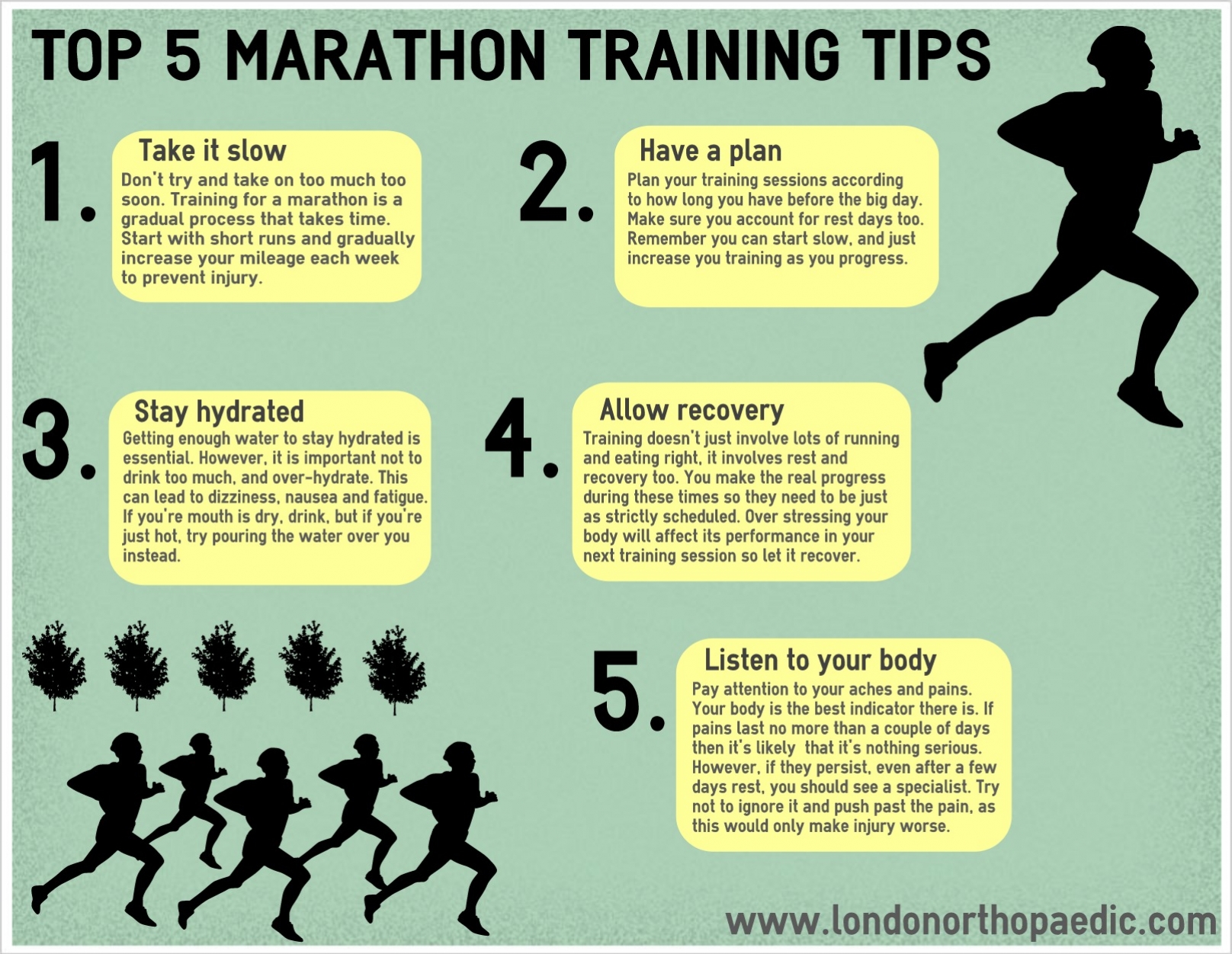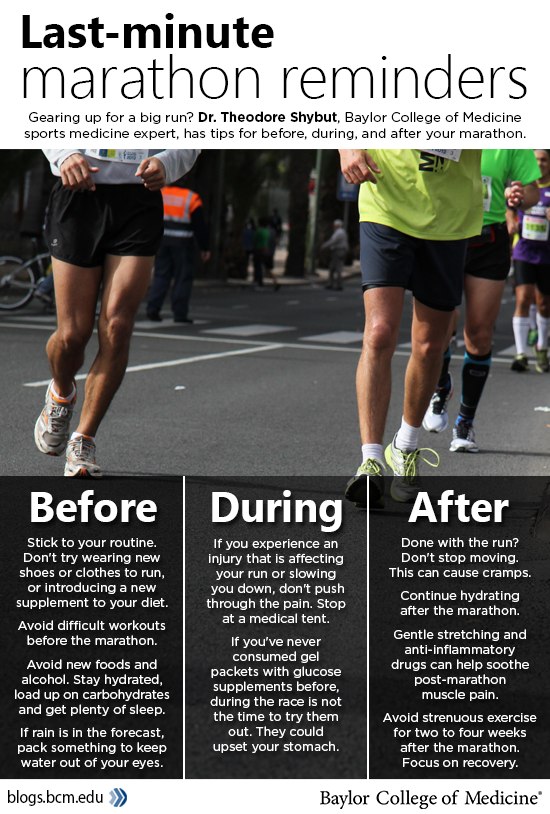Marathon Advice for Beginners
When starting marathon training, focus on building mileage gradually and incorporate cross-training for overall fitness. Consistency is key for progress in long-distance running.
Embarking on your marathon journey as a beginner can be both challenging and rewarding. As you lace up your running shoes and hit the pavement, remember that slow and steady progress is more important than trying to push too hard too soon.
Building a strong base through gradual mileage increases and incorporating strength training and cross-training will not only improve your running performance but also help prevent injuries. By setting realistic goals, staying committed to your training plan, and listening to your body, you can conquer the marathon distance and achieve your running milestones.

Credit: visual.ly
Choose The Right Training Plan
When starting your marathon journey as a beginner, selecting the right training plan is crucial. It can make the difference between reaching the finish line strong and injury-free or feeling exhausted and burnt out. Here’s how you can ensure you choose the right training plan to set yourself up for success.
Consider Your Fitness Level
Before diving into a marathon training plan, assess your current fitness level. Take into account your previous running experience, if any, and any other physical activities you may have been involved in. It’s important to start with a plan that aligns with your current capabilities to avoid overexertion and decrease the risk of injury.
Set Specific Goals
To choose the most suitable training plan, start by setting specific goals you want to achieve throughout your marathon journey. Whether it’s completing the race within a particular time frame or simply finishing it without stopping, having clear objectives will help you narrow down the available options and find a plan tailored to your aspirations.

Credit: greenletes.com
Get Proper Running Gear
For beginners aiming to tackle their first marathon, having the right running gear is essential. Get Proper Running Gear ensure comfort and reduce the risk of injuries.
Invest In Good Running Shoes
Running shoes are the most crucial piece of equipment for any runner. Invest in a pair that fits well and provides adequate support.
Choose Comfortable Clothing
Prioritize breathable fabrics that wick away sweat while allowing for easy movement. Comfort plays a key role in your performance.
Focus On Nutrition
Eat A Balanced Diet
Eating a well-rounded diet is crucial for marathon training. Include carbohydrates, protein, and healthy fats in every meal.
Additionally, consume plenty of fruits and veggies for essential vitamins and minerals.
Stay Hydrated
Proper hydration is key to performing your best during a marathon. Drink enough water throughout the day.
Avoid sugary beverages and opt for water or electrolyte-rich drinks instead.

Credit: www.all-about-marathon-training.com
Gradually Increase Mileage
When it comes to marathon training, one of the most crucial pieces of advice for beginners is to gradually increase their mileage. This gradual approach helps in building endurance and reducing the risk of injury. It’s essential to follow a progressive strategy and pay attention to your body’s signals, ensuring a safe and effective progression.
Follow A Progressive Approach
To avoid overexertion and prevent potential injuries, beginners should adopt a progressive approach to increasing their running mileage. This involves gradually increasing the distance and intensity of their runs over time, rather than attempting significant mileage jumps. This allows the body to adapt, minimizing the risk of strain or stress-related injuries.
Listen To Your Body
Listening to your body is crucial when it comes to mileage progression. It’s important to be attentive to any signs of pain or excessive fatigue. If you experience any discomfort during a run, it’s advisable to take a rest day or reduce the distance. Ignoring these signals can lead to more serious injuries, hindering your progress.
Cross-train And Include Rest Days
When embarking on your marathon journey, it’s crucial to remember that running is not the only component of your training routine. Cross-training and rest days are just as important, if not more.
Engage In Low-impact Activities
Cross-training allows you to engage in other forms of physical activity that complement your running routine. By incorporating low-impact activities like swimming, cycling, or yoga into your training schedule, you can give your running muscles a break while still staying active. These activities not only help prevent overuse injuries but also provide a full-body workout, targeting different muscle groups that running may not engage. Make sure to vary your cross-training activities to keep your routine interesting and challenging.
Allow Your Body To Recover
Rest days are just as essential as the days you spend training. Your body needs time to recover and repair itself after strenuous workouts. Overtraining can lead to fatigue, decreased performance, and an increased risk of injury. Treat your rest days with as much importance as your training days. Respect your body’s need for rest, and use these days to relax, stretch, and rejuvenate. It’s crucial to strike a balance between training and recovery to optimize your performance and prevent burnout.
Cross-training and rest days are vital components of a successful marathon training plan. Incorporating low-impact activities and giving your body the rest it deserves will help you build strength, prevent injuries, and enhance your overall performance. Remember, it’s not just about the miles you run but also the quality of your training and the care you provide to your body. So, lace-up, cross-train, and embrace those well-deserved rest days to conquer the marathon challenge!
Frequently Asked Questions On Marathon Advice For Beginners
Q: How Do I Train For My First Marathon?
A: Start by gradually increasing your mileage, follow a training plan, and listen to your body.
Q: What Should I Eat Before A Marathon?
A: Fuel up with a balanced meal, consisting of carbs, protein, and healthy fats, about 2-3 hours before the race.
Q: How Can I Avoid Hitting The Wall During A Marathon?
A: Stay hydrated, maintain a steady pace, fuel properly, and practice mental strategies to stay focused and motivated.
Conclusion
Starting a marathon journey as a beginner can be challenging but immensely rewarding. By following the right advice and staying consistent with your training, you can overcome obstacles and achieve your running goals. Remember to listen to your body, seek support from the running community, and stay motivated.
With determination and perseverance, you can conquer the marathon distance and revel in the sense of accomplishment it brings.





